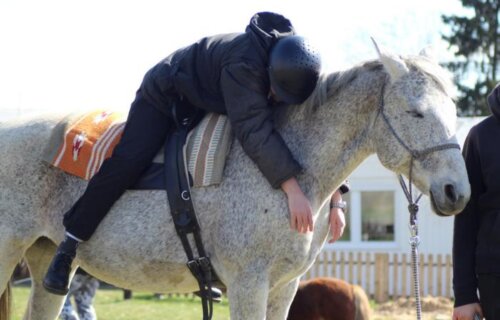PRAGUE, Czech Republic — Bonding with horses may a drug-free way to breaking substance abuse. New research suggests that interacting with horses could significantly aid those struggling with an addiction to alcohol or drugs. Thoroughbred therapy, a burgeoning area of interest within medical research, has been proven to enhance patients’ moods and quality of life, according to scientists.
Studies indicate that equine clinics, where patients engage with horses, can lead to reductions in blood pressure, anxiety, and stress levels. Recent findings also suggest that this therapy can effectively combat substance abuse.
“The positive mood of patients, their motivation and willingness to cooperate could have a fundamental influence on their remaining in a long-term addiction treatment program,” the study authors, led by Dr. Kristyna Machova of the Czech University of Life Sciences, write in the journal PLoS ONE.
The findings are based on a study involving 57 hospitalized participants, 39 of them enrolled in an experimental project called EFPP (Equine Facilitated Psychiatry and Psychology). After four two-hour sessions, these participants scored higher on the AQoL (Assessment of Quality of Life) and Health of the Nation Outcome Scales – measures of satisfaction – than 18 of their peers who did not participate in the project. Surprisingly, the participants’ scores were approximately double that of a healthy population.
Activities during the program included caring for horses, leading them on a leash, riding them, and working with them in an arena.
“A significant difference was observed in favor of the experimental group in the behavioral problems’ subscale, which includes areas such as over-activity, aggressive, disruptive or agitated behavior, intentional self-harm, and alcohol or substance abuse problems,” the team reports. “It was the improvement in the area of alcohol and drug abuse that was the aim of the EFPP program, and it seems to have been achieved in the experimental group.”

Possible reasons for this success could include the widely recognized effects of EFPP on communication, self-confidence, satisfaction from achieved goals, or improvements in quality of life.
During the year-long program, which took place weekly in seven-week segments with a month-long break in the summer and a two-week break in the winter, lessons were conducted under the supervision of a therapist with the support of two horse handlers.
The program elicited feelings of success and harmony, explained Dr. Machova. Participants gained confidence and developed new skills in managing such large animals.
“During this lesson, clients were able to gain confidence and acquire new skills in handling such a large animal,” researchers say. “During the third lesson, the clients, if they agreed, had the opportunity to ride on an unsaddled horse wearing a harness with handrails. One client, under supervision, always led the horse while another client rode it. Therefore, the clients had to perceive their mutual needs and trust each other.”
The research was conducted at the Kosmonosy Psychiatric Hospital, which houses a horse center accredited by the Czech Equine Facilitated Therapy Association. All participants were fully informed about the program and signed consent forms prior to beginning the EFPP. Data for the study was collected from January 2019 to March 2020.
While the use of dogs in hospitals, mental health institutes, and rehabilitation centers is common due to their ability to alleviate fear, particularly in children, the beneficial effects of horses are gaining increased attention. In the United Kingdom, horses are even being used in programs to help young ex-offenders address trauma and rebuild their lives.
“Horses are extremely sensitive to human emotions,” says Bristol-based Key4Life, according to a statement from SWNS. “They can help individuals develop empathy, self-control, and self-esteem, as well as improve communication skills.”
Contact with animals stimulates the human brain
In 2022, researchers in Switzerland found that seeing, feeling, and touching a dog boosts neurons in the pre-frontal cortex — the area of the brain that helps regulate emotional interactions.
The study, also published in the journal PLoS ONE, found the effect persists after the dogs are no longer present, but drops off when researchers replaced live dogs with stuffed animals.
The team notes that this difference was largest for petting, which was the most interactive condition. Another key finding was prefrontal brain activity increased each time people interacted with a real dog.
You might also be interested in:
- Battling back pain? Taking up horseback riding can actually bring relief
- Addiction, substance abuse affects 3 in 4 Americans in some way, survey reveals
South West News Service writer Mark Waghorn contributed to this report.


Therapeutic horse riding can also help SPECIAL NEEDS KIDS, helps them express themselves better & helps fight any trauma they’ve had. Interestingly, my youngest son is currently promoting this for a local company that doesn’t have enough funds to run at capacity & he had me review a clip he produced LAST NIGHT! But YOUR article shows that the benefits are far greater than I could have imagined. I work with at-risk high school students & I want to send my principal your article to see if we can work with horse therapy with our students. THANK YOU!